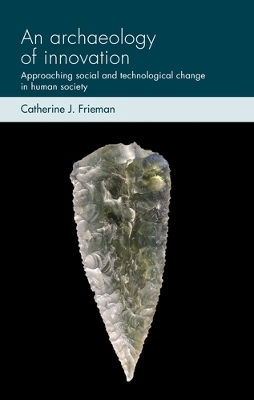
An Archaeology of Innovation
Approaching Social and Technological Change in Human Society
Seiten
2021
Manchester University Press (Verlag)
978-1-5261-3264-2 (ISBN)
Manchester University Press (Verlag)
978-1-5261-3264-2 (ISBN)
This monograph takes a unique archaeological approach to the investigation of innovation and the innovation process. Case studies span the breadth of human history, from our earliest hominin ancestors to the contemporary world. The emphasis is on the social context and temporality of invention, adoption, creativity and resistance. -- .
An archaeology of innovation is the first monograph-length investigation of innovation and the innovation process from an archaeological perspective. It interrogates the idea of innovation that permeates our popular media and our political and scientific discourse, setting this against the long-term perspective that only archaeology can offer. Case studies span the entire breadth of human history, from our earliest hominin ancestors to the contemporary world. The book argues that the present narrow focus on pushing the adoption of technical innovations ignores the complex interplay of social, technological and environmental systems that underlies truly innovative societies; the inherent connections between new technologies, technologists and social structure that give them meaning and make them valuable; and the significance and value of conservative social practices that lead to the frequent rejection of innovations. -- .
An archaeology of innovation is the first monograph-length investigation of innovation and the innovation process from an archaeological perspective. It interrogates the idea of innovation that permeates our popular media and our political and scientific discourse, setting this against the long-term perspective that only archaeology can offer. Case studies span the entire breadth of human history, from our earliest hominin ancestors to the contemporary world. The book argues that the present narrow focus on pushing the adoption of technical innovations ignores the complex interplay of social, technological and environmental systems that underlies truly innovative societies; the inherent connections between new technologies, technologists and social structure that give them meaning and make them valuable; and the significance and value of conservative social practices that lead to the frequent rejection of innovations. -- .
Catherine J. Frieman is Associate Professor of European Archaeology at the School of Archaeology and Anthropology, Australian National University -- .
Introduction: loomings
1 Innovation as discourse
2 Messy narratives/flexible methodologies
3 Invention as process
4 Power, influence and adoption
5 Pass it on
6 Tradition, continuity and resistance
7 Create/innovate
Conclusion: the widening gyre
Index -- .
| Erscheinungsdatum | 10.05.2021 |
|---|---|
| Reihe/Serie | Social Archaeology and Material Worlds |
| Zusatzinfo | 26 black & white illustrations |
| Verlagsort | Manchester |
| Sprache | englisch |
| Maße | 156 x 234 mm |
| Gewicht | 576 g |
| Themenwelt | Geisteswissenschaften ► Archäologie |
| Geschichte ► Teilgebiete der Geschichte ► Technikgeschichte | |
| Naturwissenschaften | |
| ISBN-10 | 1-5261-3264-8 / 1526132648 |
| ISBN-13 | 978-1-5261-3264-2 / 9781526132642 |
| Zustand | Neuware |
| Haben Sie eine Frage zum Produkt? |
Mehr entdecken
aus dem Bereich
aus dem Bereich
Buch | Softcover (2024)
Lehmanns Media (Verlag)
19,95 €
Digitalisierung neu denken für eine gerechte Gesellschaft
Buch | Hardcover (2023)
Quadriga (Verlag)
20,00 €
Vom Perceptron zum Deep Learning
Buch | Softcover (2022)
Springer Vieweg (Verlag)
19,99 €


